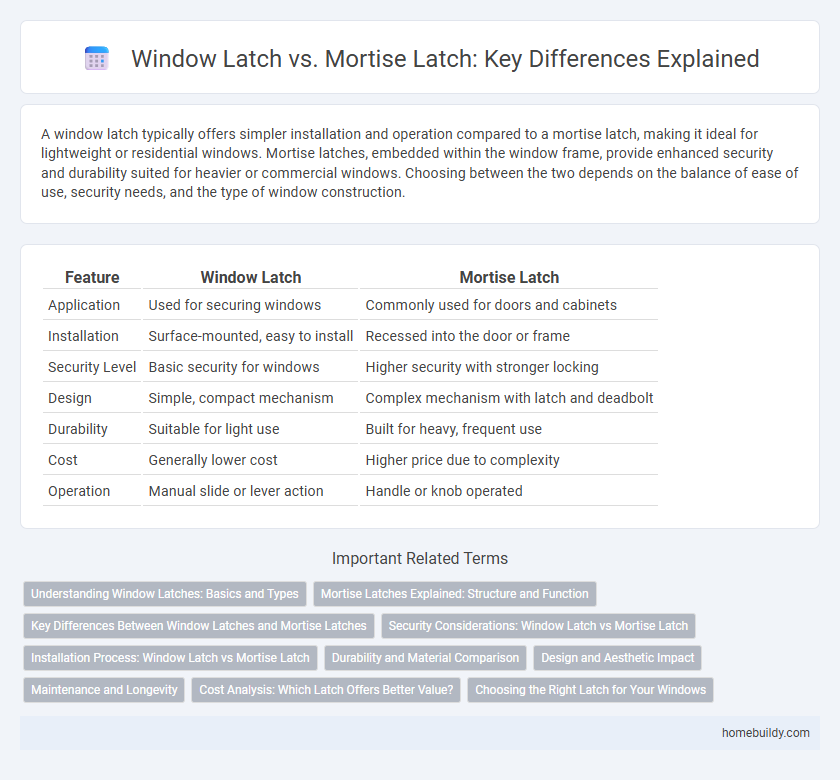A window latch typically offers simpler installation and operation compared to a mortise latch, making it ideal for lightweight or residential windows. Mortise latches, embedded within the window frame, provide enhanced security and durability suited for heavier or commercial windows. Choosing between the two depends on the balance of ease of use, security needs, and the type of window construction.
Table of Comparison
| Feature | Window Latch | Mortise Latch |
|---|---|---|
| Application | Used for securing windows | Commonly used for doors and cabinets |
| Installation | Surface-mounted, easy to install | Recessed into the door or frame |
| Security Level | Basic security for windows | Higher security with stronger locking |
| Design | Simple, compact mechanism | Complex mechanism with latch and deadbolt |
| Durability | Suitable for light use | Built for heavy, frequent use |
| Cost | Generally lower cost | Higher price due to complexity |
| Operation | Manual slide or lever action | Handle or knob operated |
Understanding Window Latches: Basics and Types
Window latches secure sashes by engaging a catch or strike plate, offering basic functionality for locking and safety. Mortise latches, integrated within the window frame, provide enhanced security through a recessed mechanism and often include locking bolts for extra durability. Choosing between window latch types depends on security needs, aesthetic preferences, and window design compatibility.
Mortise Latches Explained: Structure and Function
Mortise latches are designed with a rectangular mechanism that fits into a pocket within the window frame, offering a secure and flush installation compared to surface-mounted window latches. The internal structure includes a latch bolt operated by a handle or knob, allowing precise control over window locking and releasing. This design enhances durability and aesthetic appeal, making mortise latches ideal for traditional and high-security window applications.
Key Differences Between Window Latches and Mortise Latches
Window latches are typically surface-mounted hardware designed for securing windows by locking the sash to the frame, offering straightforward installation and ease of use. Mortise latches, embedded within the edge of the door or window frame, provide enhanced security through a more complex locking mechanism integrating a latch bolt and deadbolt. The key differences lie in their installation methods, security levels, and applications, with window latches favoring simplicity and mortise latches emphasizing robust locking performance.
Security Considerations: Window Latch vs Mortise Latch
Window latches provide basic security by preventing windows from being easily opened, but they often lack the robustness and tamper resistance found in mortise latches. Mortise latches, installed within the window frame, offer enhanced protection due to their embedded locking mechanisms that resist forced entry and manipulation. When prioritizing home security, mortise latches are generally preferred for their durability and effective deterrence against break-ins compared to standard window latches.
Installation Process: Window Latch vs Mortise Latch
The installation process for a window latch is typically simpler and quicker, requiring minimal tools and surface mounting directly onto the window frame. Mortise latches demand more precise, intricate work involving cutting a recess or mortise into the window sash or frame to house the latch mechanism securely. Due to this complexity, mortise latch installation often requires professional skills and more time compared to the straightforward procedure for standard window latches.
Durability and Material Comparison
Window latches are typically made from durable materials such as zinc alloy, stainless steel, or brass, offering strong resistance to rust and wear, which enhances their longevity in various weather conditions. Mortise latches, often crafted from heavy-duty metals like solid brass or steel, provide exceptional durability and long-term reliability due to their robust internal locking mechanism designed for high-security applications. Comparing both, window latches prioritize corrosion resistance for exterior use, while mortise latches emphasize mechanical strength and durability suited for heavy or frequently used doors and windows.
Design and Aesthetic Impact
Window latches typically feature a compact, visible design allowing easy access and minimal installation complexity, enhancing the window's decorative appeal with various styles and finishes. Mortise latches, embedded within the window frame, offer a sleeker, more discreet appearance that maintains a clean line and a higher-end aesthetic, often favored in traditional or historic window restorations. The choice between a surface-mounted window latch and a mortise latch significantly influences the overall window design cohesion and visual impact.
Maintenance and Longevity
Window latches generally require less maintenance compared to mortise latches due to their simpler external mechanism, reducing the risk of internal wear and corrosion. Mortise latches, embedded within the window frame, demand regular lubrication and inspection to ensure smooth operation and prevent rust buildup that can compromise longevity. Choosing a high-quality, corrosion-resistant material significantly extends the lifespan of both latch types, but window latches typically offer easier access for maintenance tasks.
Cost Analysis: Which Latch Offers Better Value?
Window latches typically cost less upfront than mortise latches, making them a budget-friendly option for basic security needs. Mortise latches, while more expensive, provide enhanced durability and security, often justifying the higher price through long-term value and reduced maintenance costs. Evaluating actual usage, the cost-effectiveness of a window latch versus a mortise latch depends on balancing initial investment with desired security and longevity.
Choosing the Right Latch for Your Windows
A window latch provides straightforward security and ease of use, ideal for standard window types with surface mounting, while a mortise latch offers enhanced durability and a flush fit for wooden sash windows requiring a more discreet locking mechanism. Selecting the right latch depends on window material, desired security level, and installation complexity, with mortise latches typically preferred for historic or high-end wooden windows due to their integrated design. Consider the maintenance requirements and aesthetic preferences to ensure the window latch complements both functionality and style.
window latch vs mortise latch Infographic

 homebuildy.com
homebuildy.com